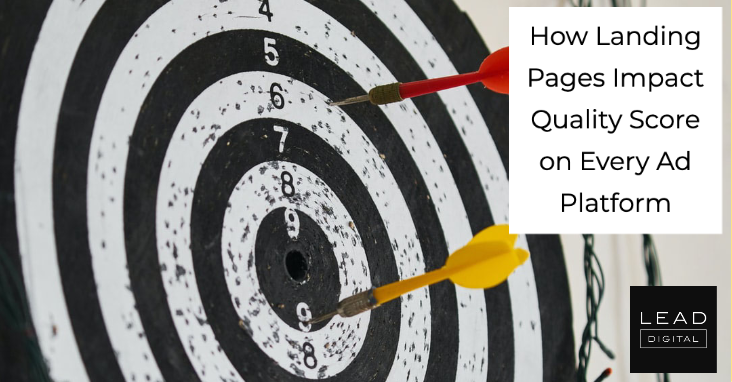 In the world of pay-per-click (PPC) advertising, there are few misperceptions as rampant as the ones about the effects that landing pages have on Quality Score. That’s not surprising, given that Quality Score algorithms are “black boxes” that play a crucial role in the success of any PPC campaign. We still have very little insight into how Google Ads, Microsoft Advertising (formerly Bing Ads), and the social media advertising platforms calculate and use Quality Score.
In the world of pay-per-click (PPC) advertising, there are few misperceptions as rampant as the ones about the effects that landing pages have on Quality Score. That’s not surprising, given that Quality Score algorithms are “black boxes” that play a crucial role in the success of any PPC campaign. We still have very little insight into how Google Ads, Microsoft Advertising (formerly Bing Ads), and the social media advertising platforms calculate and use Quality Score.
Landing pages are often a customer’s first interaction with a brand and set the stage for the relationship going forward. Distilling Quality Score into a number is misleading for PPC advertisers because it undervalues the importance of landing pages on several other crucial components of a campaign, such as brand perception and positioning.
As a side note, most ad platforms use the term “Quality Score,” while others use “Ad Relevance” or something similar. For the sake of simplicity, I use Quality Score interchangeably with Ad Relevance and Relevance Score metrics unless otherwise noted. Let’s get into it!
What Is Quality Score & Why Does It Matter to PPC Advertisers?
Quality Score is an approximation of your keywords’ and ads’ relevance to your target audience. It’s usually represented in the ad platforms as a number from 1-10. This dramatically oversimplifies the complex and user-specific Quality Score inputs factored into each ad auction, but it’s the best we have. Search engines and social media platforms use this metric to decide which ads to show and how much to charge an advertiser for each click or impression.
Google Ads pioneered Quality Score in their Ad Rank algorithm to reward advertisers that created relevant ads with a lower cost per click. Advertisers that try to show irrelevant ads to uninterested users may receive a lower Quality Score and have to pay a higher cost per click to remain visible.
As you can see in the equation below, providing a great user experience to boost your Quality Score can improve your Ad Rank and lower your cost per click. From what we can tell, most PPC platforms use an equation like the one below to determine where your ads appear.

However, each ad platform treats landing pages differently in their Quality Score equations. Savvy PPC advertisers should understand the nuance of each platform to tailor their campaigns for the best results. As a shorthand, the table below shows the similarities and differences between each major ad platform’s version of Quality Score as well as the associated factors:

In simple terms, here’s the question platforms are asking when they evaluate your ads against these different attributes:
- Landing Page Experience: Is your ad’s landing page relevant to the visitor’s intent and does it help them accomplish their objectives quickly and transparently?
- Ad Click Through Rate/Engagement: Are your ads clicked as often as competing ads?
- Ad Relevance: Do your ads align with your audiences’ interests and intent?
- Post-Click Conversion Rate: Are visitors likely to convert or take meaningful action after clicking your ad?
- Recency: Are your ads recently published or updated regularly?
If the answer to any of these questions is “no,” there’s a good chance your Quality Score is suffering as a result.
How Do Landing Pages Impact Quality Score on Different Platforms?
Landing pages are an important part of Quality Score algorithms and, fortunately, are one of the easiest elements of a PPC campaign to control. The most important part of the “Landing Page Experience” component of Quality Score is providing a positive visitor experience. Answer their search intent with relevant content, provide lightning-fast page speed, and make sure your site looks great on all screen sizes.
When done correctly, landing pages can have a positive impact on Google Ads Quality Score. That means a lower cost per click and higher conversion rates when compared to sending traffic to a website. And even though some ad platforms do not explicitly factor landing pages into their Quality Scores, marketers shouldn’t ignore the improvement in visitor experience and their likelihood of developing a positive association with your brand.
1. Google Ads – Quality Score
Google Ads’ support content explicitly mentions the importance of landing pages for creating a positive user experience. I want to emphasize the experience portion because most people assume that Google Ads Quality Score only focuses on landing page relevance. Your landing pages must be relevant to keywords and ads that your visitors clicked on, yes, but it’s just as important to Google that your landing page loads quickly, is secure, and looks great on all screens. – Read more




